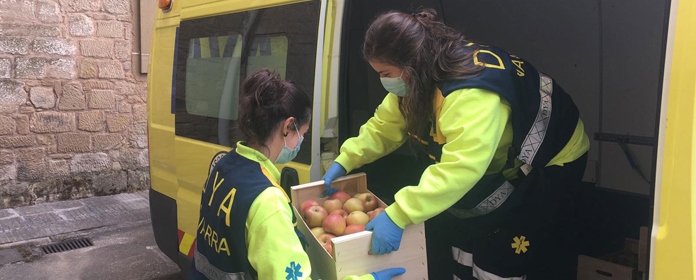Nursing students collaborate in various actions of volunteer activities to help during the crisis.

"Since I'm in 3rd grade, I couldn't work in hospitals and nursing homes. But, even if I wasn't in the front line as a nurse, I wanted to look for any other way to help". This is how Almudena Canales remembers what encouraged her to collaborate, within her possibilities, in this status caused by the pandemic. "Through the WhatsApp group of class and my friends I received many messages from hospitals asking for letters for the sick, to make them feel accompanied and supported. It seemed to me something very simple and easy to do, and that could help a lot," she explains. And since then, he has been writing letters regularly, which he sends through Tantaka or directly to the e-mail addresses that many hospitals have set up.
"As far as I know, we are seven colleagues writing, but surely there are more because we spread the message through other whatsapp groups, from our families and friends. We have written to the San Carlos Clinic, Alcorcón Hospital, 12 de Octubre, La Paz Hospital, Ramón y Cajal, La Princesa, Gregorio Marañón...", he says.
Almudena also used to go to the DYA to help with disinfection work or handing out medical supplies, but given the Issue of volunteers, she is on a waiting list. "The truth is that I would love to be doing something else. But at the same time I am glad to be on the waiting list, because that means that there are a lot of people who want to help, and I know that now the best thing I can do is stay at home, continue studying so that someday I can be there with the rest of the nurses and continue writing letters, so that the patients feel supported," she concludes.
Food distribution to those who need it mostThe one who is collaborating with DYA Navarra is Anne Arbuniés, a nursing student. She financial aid there as a lifeguard for a year and collaborates with them in other services, such as concerts, races, sporting events or Education CPR and AED in schools. That is why, when the confinement was imposed, she had it clear: "I am a very active person and I needed to feel useful. I couldn't stay at home all day just studying.
Anne collaborates in the Food Bank service. "What we do is to go, from Monday to Friday, to the Food Bank, where we are entrusted with transporting food to those people who cannot afford to buy it, and to associations, old people's homes or convents," she explains. "We don't have a fixed schedule . It depends on the number of orders scheduled for each day. We usually start at 8 a.m. and work until we finish delivering the last order. It can be 2 p.m. or 5 p.m.".
"It makes me very happy to see the grateful faces of the people when you help them. Their messages of encouragement and support, every day, encourage us to continue with our work. This experience is teaching me that there is always a way to help, even if it is not in the focus of the problem, and that every subject from financial aid is welcome.", she emphasizes.
A small grain of sandLeyre Larumbe, a 3rd year student, is also happy to be able to contribute her small grain of sand in this status. "I live in Obanos and I saw that in the town people were moving a lot to help a little: fumigating the streets, making masks, encouraging people with music...", she explains. "The town council asked for volunteers, I signed up on a list and when there is a need with a neighbor they contact me. What I do is to take the shopping and take out the garbage to people who, either because of illness or because they are at risk, cannot go out on the street. receipt a message with what I have to buy, I do the shopping and take it to their house and when I leave the shopping I throw out the garbage". "I think it doesn't cost much to help a little," she says.
Protective screens and more letters for patientsPilar Gimeno, a 1st year student, collaborated for a while in a volunteer activities promoted by the police. "I went twice a week and spent three hours helping out. There were about 40 of us volunteers. What we did was to make protective screens with hard plastic (acetate), the plastic visor and a rubber band. We did it in a chain so that everything would go faster. When we finished, we picked everything up, swept and scrubbed so that nothing was dirty or contaminated," he explains.
However, when the material ran out, that volunteer activities ran out and Pilar had to find another way to help. Now she does so through the "Sponsor a patient" initiative, which has been launched by the Clínica Universidad de Navarra. "The idea is to write letters once a week, every two days... or whenever everyone can, and send them to the mail heroes.covid@unav.es. The idea is to give encouragement, hope... in general, to help make the time spent by hospitalized patients more pleasant," he explains.
"The status of confinement is not easy. Although I'm coping well, there are times when it's harder for me. But then I think of all the staff healthcare and sick people and I see that I can't complain," he concludes.




